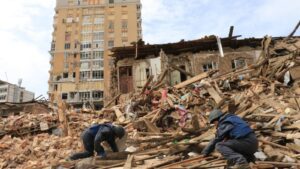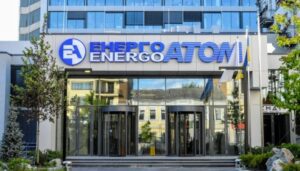
The draft law “On grapes and wine products” (#9139) the government registered in the Verkhovna Rada on March 22 aims to implement relevant EU regulations on winegrowing and winemaking, enological practices, production of flavored wine products, use and protection of geographical indications of wine.
“At the same time, the purpose of the bill is to create a unified state information system “Vine and Wine Register”, which will include information on: producers of grapes; wine products; vineyard plots; mandatory declarations and other data on wine products provided by this law, the introduction of information in which is mandatory, ensuring the effective administration and state support of the viticulture and wine industry,” – also stated in the explanatory
The document implies the introduction of requirements for the production and circulation of wines, products of viticulture and winemaking, flavored wine products with geographical indications, similar to the current rules in the EU. In particular, blending of wine produced in Ukraine with imported wine as well as wine produced outside Ukraine is not allowed.
In addition, the bill provides for the possibility of state support for viticulture and winemaking in the framework of the general laws “On state support of agriculture” and “On the specifics of insurance of agricultural products with state support” without any details, except for the principles of objectivity, equality and proportionality.
The document also contains the principles of inspection of wine production from the vine bush to the final product, defines the controlling institutions and their powers and specifies sanctions, the explanatory note states.

The Verkhovna Rada of Ukraine has adopted in general draft law No. 7198 on the creation of a state register of housing damaged and destroyed as a result of Russia’s armed invasion of Ukraine, and the procedure for compensation for it.
The bill was supported by 275 people’s deputies at Thursday’s meeting, Yaroslav Zheleznyak, a member of the Golos faction, said in a Telegram feed.
According to the draft law, compensation will be provided only for residential property damaged or destroyed since February 24, 2022. At the same time, the law does not apply to the objects that on the date of martial law were located in the temporarily occupied territories.
Owners of apartments and other residential premises will be able to receive a housing certificate confirming guarantees of the state to finance the purchase of housing (including those built in the future) within a certain amount, while owners of private houses will have a choice between receiving a certificate and monetary compensation. Such monetary compensation will be accrued in a special regime to finance construction.
The bill does not set a limit on the amount of compensation, as well as limits on the location, type and size of new housing financed by the certificate. At the same time, if the cost of housing will be lower than the amount specified in the certificate, the balance of compensation will be paid only at the expense of funds received from the Russian Federation for the reimbursement of damages.
The term for applying for compensation is during martial law and within one year after its cancellation. It is possible to use the certificate within five years from the date of its issue, and it is prohibited to alienate housing (except inheritance) for five years.
The applications will be considered by the commissions for consideration of compensation established by the executive bodies of local councils, military or civilian-military administrations.
According to the draft law, sources of financing of compensations can be state and local budgets; funds from international financial organizations, creditors and investors; international technical and/or refundable or non-refundable financial aid; reparations or other recoveries from Russia and others.
As reported, Ukrainians have already submitted more than 325,000 reports of destruction or damage to housing through Diya

The Verkhovna Rada has postponed consideration of draft law No. 8067 on transforming NNEGC Energoatom into a joint stock company as a whole to the next plenary session, parliamentarian Yaroslav Zheleznyak (Golos faction) said.
“We began to consider #8067 – the transformation of Energoatom into a joint stock company as a whole. Started, but did not finish, as they delayed the amendments,” wrote Zheleznyak in the “Telegram Channel” on Friday.
According to the deputy, the vote for the law will already take place at the next plenary session.
As reported, the Verkhovna Rada on October 19, 2022 supported the first reading of the draft law № 8067 “On Joint Stock Company” National Nuclear Energy Generating Company “Energoatom”.
According to the explanatory note to the document, its goal is to establish the legal, economic and organizational basis for the establishment and operation of the joint stock company “National Atomic Energy Generating Company “Energoatom” by reorganizing (transforming) the state enterprise “NAEK “Energoatom”.
The document defines the procedure of formation and functioning of the joint stock company NAEK Energoatom, 100% of shares of which are owned by the state.
According to the document, the founder of the company is the state in the person of the Cabinet of Ministers of Ukraine, which decides on the establishment of the company and manages the state corporate rights of the JSC.
It is stipulated that the shares acquired by the state as a result of the company’s formation are not subject to privatization.

The main corruption risk of the draft law No 5655 on reform of the urban planning sphere is its elaboration with violations of the principle of transparency and consideration of the public opinion.
This position is stated by the National Agency for the Prevention of Corruption (NAPC) in a letter to the National Union of Architects of Ukraine (NUAU), the deputy chairman of the Architectural Chamber of NUAU Anna Kiriy told Interfax-Ukraine.
“The National Agency has always emphasized – both in its public position at the Committee’s November 28, 2022 meeting and in its informal communication with diplomats from the G7 countries – that the main corruption risk of the draft law is that it is not developed in an open and inclusive way, in violation of the principle of transparency and consideration of public opinion, established by the Law of Ukraine “On the Principles of State Regulatory Policy in the Business”, – said in a letter of NACA.
At the same time, the specialized committee of the Verkhovna Rada did not fully take into account the observations of the NAPC on the finalization of the bill at the meeting on December 9, the agency notes.
According to the NACC, the finalized bill still contains a rule that establishes the principle of tacit consent to restore the right to perform preparatory and construction works by the customer / contractor in the case of failure by the authorized person of the body of urban control for entry into the Register of construction activities to file a claim for termination of such right within 30 days from the date of the writ.
In turn, the National Agency recommended deleting this rule in the final version of the law.
The NACP emphasizes that its representatives did not participate in the meeting of the Profile Committee on December 9 and the Parliament meeting on December 13, when the law was passed, and therefore can not fully evaluate the extent to which its recommendations and comments were taken into account in the final version of the law.
The National Agency also never campaigned either for or against the bill, but conducted an anticorruption assessment and additional analysis of the bill with the provision of comments within its competence, the letter said.
As it was reported, on December 13, the Verkhovna Rada adopted as a whole the draft law № 5655 on reforming the sphere of urban planning. It was voted for by 228 deputies. A petition with a demand to veto the bill has collected more than 25 thousand signatures and is pending consideration by the president.
Earlier, on December 1, 2022, the bill was withdrawn from consideration by Parliament. The Association of Ukrainian Cities, mayors of cities, the Ministry of Culture and Information Policy and the National Union of Architects of Ukraine insisted on its revision.

A petition demanding to veto the draft law No.5655 on reforming the sphere of urban planning, posted on the website of the President of Ukraine, has collected more than 25 thousand votes on the day of its adoption by the Parliament.
Now the petition should be considered by the head of state.
“New town-planning regulations under the guise of liberalizing the urban planning sphere and accelerating the construction actually untie the hands of large developers, who now do not have to go through checks from local authorities. Checks of construction and documentation of the project can be carried out by private firms, and the role of chief architects of the cities in this process is greatly restricted. If the law is adopted by the majority of deputies of the Verkhovna Rada at the next session, the process of chaotic development of our cities and the desecration of historical monuments will be accelerated,” – says the text of the petition.
As it was reported, on December 13, the Verkhovna Rada passed the bill as a whole #5655. It was voted for by 228 deputies.
Earlier, on December 1, 2022, the bill was withdrawn from consideration by Parliament. The Association of Ukrainian Cities, mayors, the National Agency for the Prevention of Corruption (NAPC), the Ministry of Culture and Information Policy, and the National Union of Architects of Ukraine insisted on its revision.

The National Agency for the Prevention of Corruption (NAPC), after reviewing the finalized version of draft law No. 5655 on the reform of urban planning activities, assessed it as inconsistent with the anti-corruption strategy and recommends finalizing the draft law.
“According to the anticorruption strategy for 2021-2025 the priority spheres for introduction of anticorruption measures are determined, in particular construction, land relations and infrastructure. The problems in this area are determined, among others, by the imperfection of the existing instruments of control and lack of transparency in the construction processes. After reviewing the finalized version of the draft law, it was found that the proposed wording does not solve the problems identified and is therefore not consistent with the anti-corruption strategy,” – said deputy chairman of the NACP Andriy Vishnevetskiy in a letter to the specialized committee of the Verkhovna Rada, the agency “Interfax-Ukraine” got acquainted with.
Thus, the comments and recommendations of the NAPC among other things noted that the bill number 5655 does not provide a mechanism for remedying violations of the law identified through the implementation of supervision, there are no sanctions for the objects of supervision in the case of violations and it is not indicated how these violations must be resolved. There is also no procedure for cancellation of the right of construction obtained on the basis of submitted documents that contradict the urban planning legislation. That is why it is suggested to provide for a procedure of termination of the right for construction and annulment of permits in case of violation revealed by the supervisory authority.
The draft law No. 5655 suggests supplementing the law “On regulation of town planning activity” with new Article 383 and stipulating that a construction object constructed or under construction in violation of restrictions of land use cannot be considered as unauthorized construction if such restrictions are not stated in the town planning conditions and restrictions and/or are not included into the State Land Cadastre.
“The above circumstances practically legalize construction in violation of restrictions on land use. Regarding the availability of information about the restrictions of land use in the State Land Cadastre it should be noted that the information entered in the State Land Cadastre is incomplete, is in a state of creation and may not contain data about a particular plot of land,” reads the comments.
In this case NAPK recommends to provide as a reason for refusal to grant urban conditions and restrictions (UZK) inconsistency of data and information in order to obtain UZK to the requirements of urban planning documents, and during the development of projects and examination to establish compliance with the requirements of urban planning documents at the local level. In addition, NAPC filed a number of other proposals.